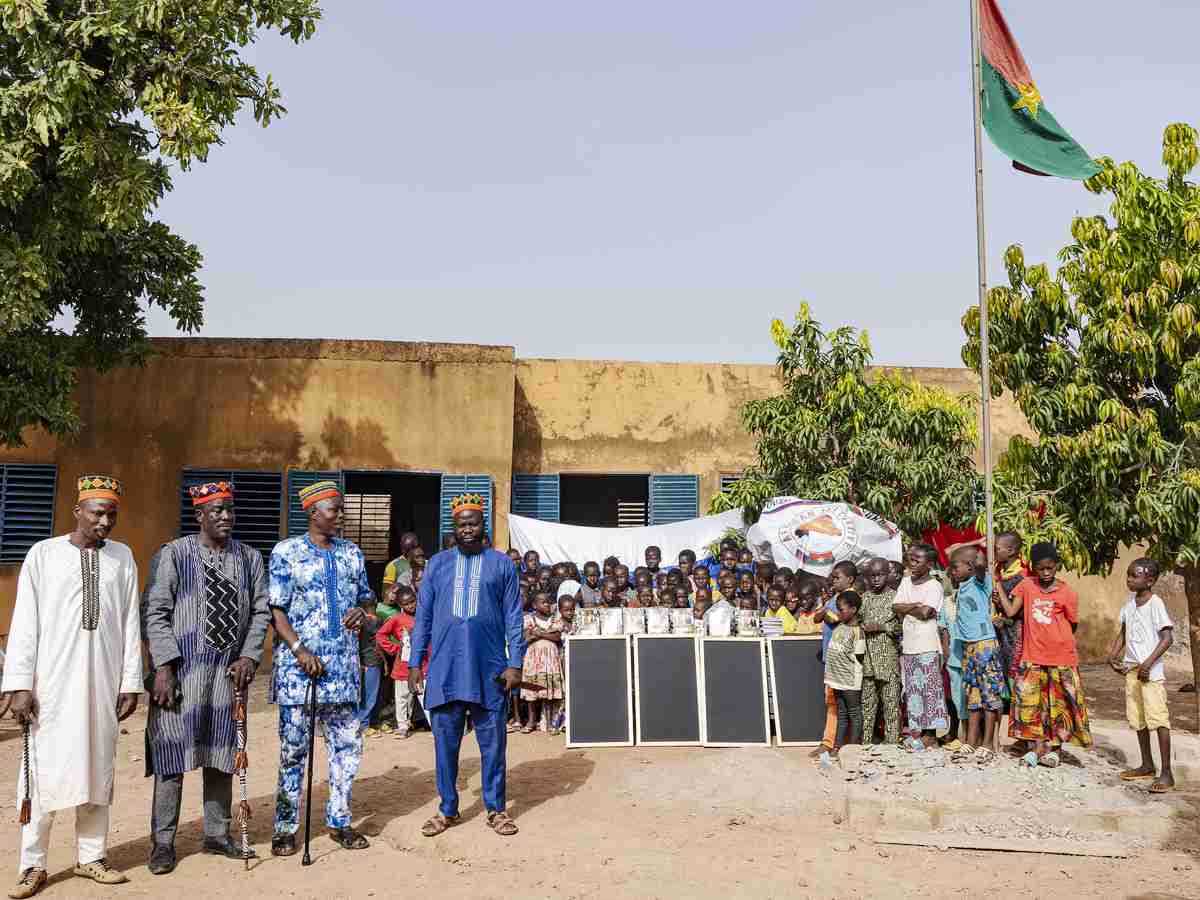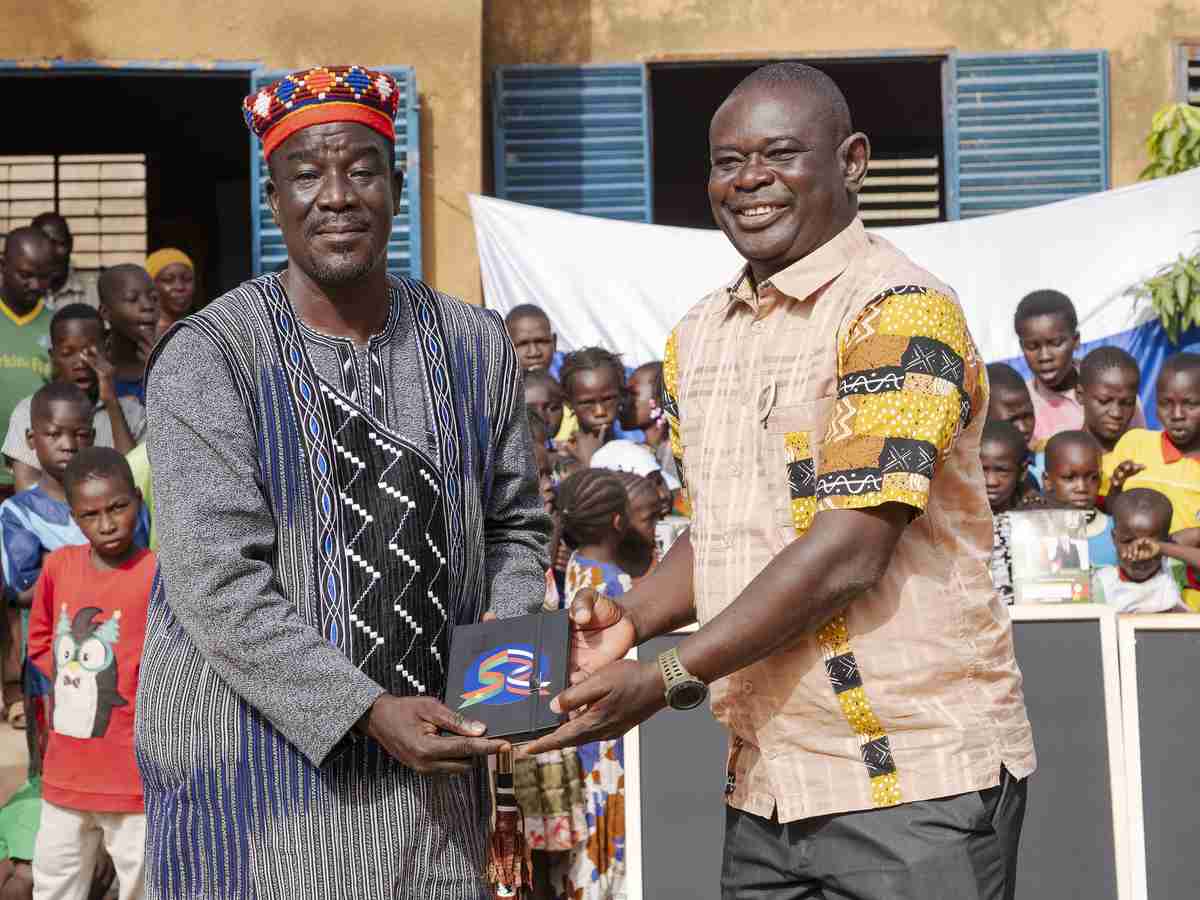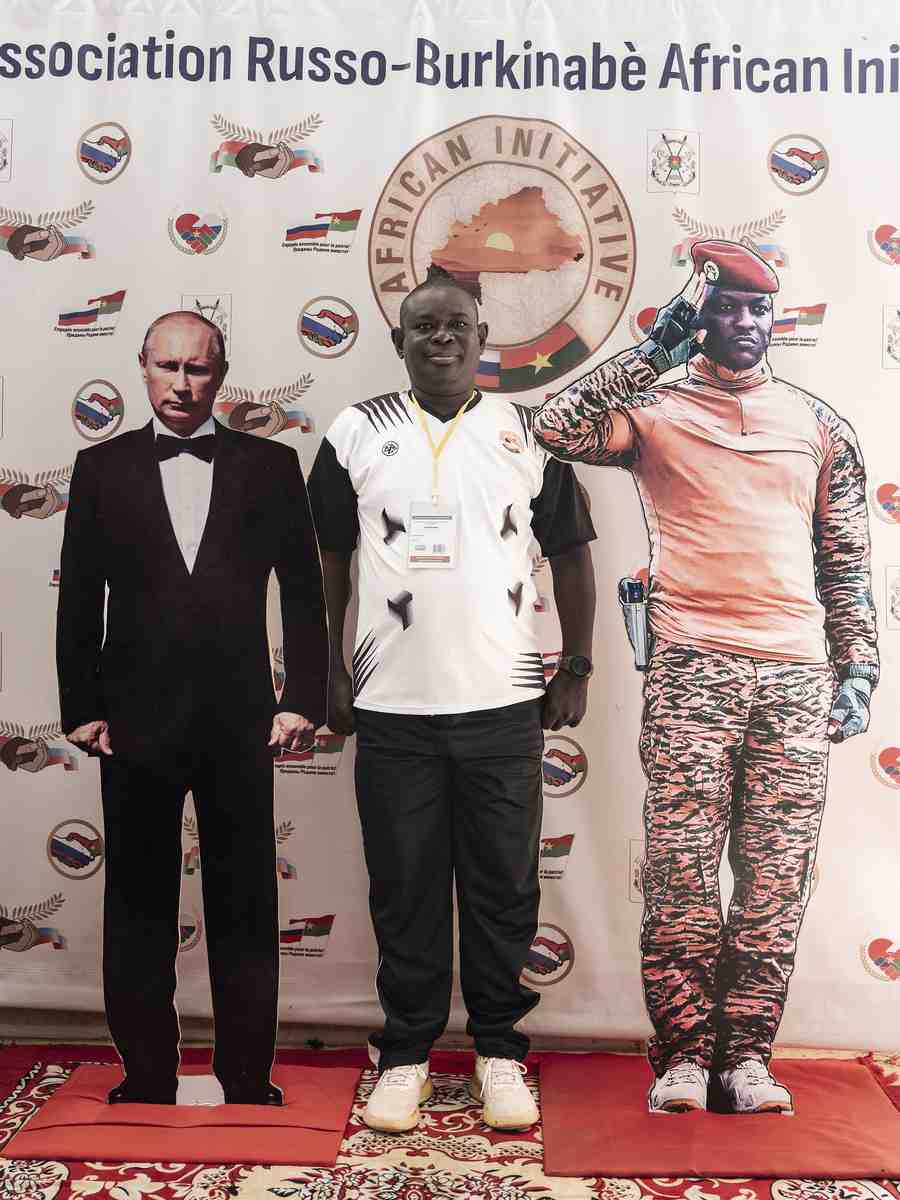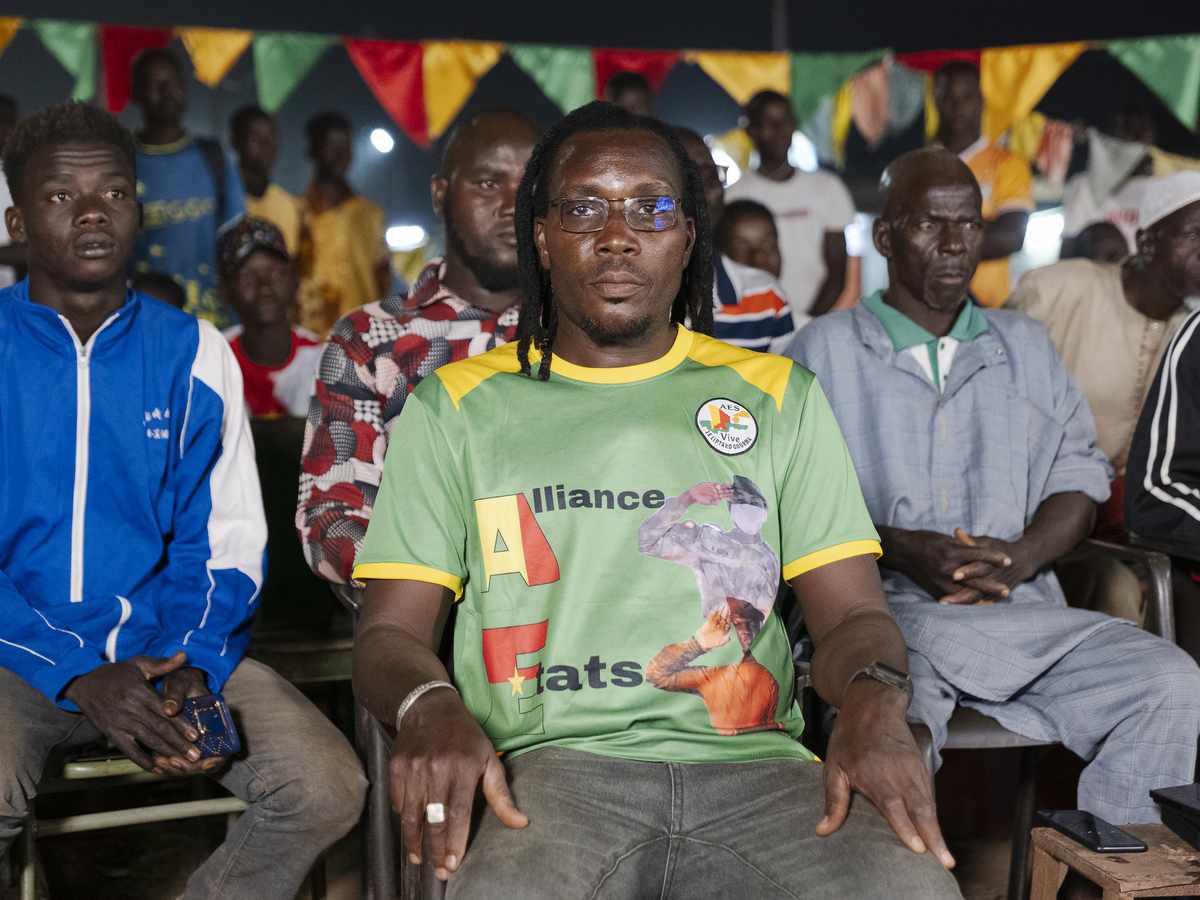
Officials and students during a ceremony last month in Ouagadougou, Burkina Faso, where they received blackboards and other supplies from the pro-Russian group African Initiative.
16:04 JST, December 4, 2024
OUAGADOUGOU, Burkina Faso – When Zoubiré Patrice Sia needed blackboards and notebooks for the school he had founded, he knew where to call. He had seen a pro-Russian group called African Initiative promoted on television, in newspapers and online.

The school’s leader, Zoubiré Patrice Sia, receives a notebook from African Initiative President Soumaïla Azenwo Ayo.
The group’s president “didn’t even hesitate,” Sia said, and together they were hauling new blackboards and hundreds of notebooks into the school courtyard on a recent Monday. Each notebook was adorned with a photo of Burkina Faso’s interim president, Ibrahim Traoré, and Russian President Vladimir Putin, their hands clasped.
“Ibrahim Traoré,” shouted African Initiative President Soumaïla Azenwo Ayo. “Hoorah!” the students responded.
“Vladimir Putin!” Ayo shouted next. “Hoorah! Hoorah! Hoorah!” the students chanted in response, just as they had rehearsed with Sia, pumping their fists.
In the year since its creation, Ayo said, African Initiative has hosted dozens of events to promote “friendship between the Burkinabe and Russian people” and gained nearly 10,000 followers across its Facebook and Telegram pages.
It is part of an opaque network of groups that Western officials and analysts say the Kremlin uses to boost Russia’s image – and tarnish that of Western countries – as it seeks to restore its influence in Africa. The U.S. State Department this year accused African Initiative’s partner organization, based in Moscow, of seeking to undermine U.S.-funded public health projects across Africa, which the group has denied.
In recent years, Russia has intensified its efforts in this part of West Africa, where military strongmen have overthrown governments seen as close to the West, especially France, and where Islamist extremist violence is spiking. Burkina Faso, with 23 million people, is at the epicenter of that violence, and its president has become a leading proponent of working with Russia in an effort to stem it.
On the ground in Ouagadougou, the capital, African Initiative has sponsored Russian martial arts competitions; Russian movie showings, including films promoting Russia’s Wagner mercenaries; and raffles with expensive prizes to attract followers to the group’s social media channels. Last month, Washington Post journalists were afforded access to some of African Initiative’s activities.
At the school, Sia said he had not known much about Russia until recent years, when Traoré forged a relationship with Putin and turned to Moscow for arms and training in the fight against Islamist extremists.
Sia said he has nothing against the United States or Europe. But when Burkina Faso most needed help, he said, it was Russia that stepped up.
As the schoolchildren gathered in front of a Russian flag strung between a tree and the corner of the building, Ayo broke into a speech declaring that Russia and Burkina Faso would triumph in the “war of decolonization.” The students chanted and cheered.
African Initiative staff snapped photos and took videos, which would soon be shared on the group’s Facebook and Telegram pages.
Unconditional love for Russia

African Initiative’s Ayo poses with cutouts of Russian President Vladimir Putin and Burkina Faso’s interim president, Ibrahim Traoré, at the International Artisanal Fair.
A day earlier, Ayo had been arranging blue-and-yellow Russian nesting dolls at a stand promoting Russian culture at one of Burkina Faso’s biggest festivals. Behind him were glossy photos of Russian cities; next to him were life-size cutouts of Putin in a suit and Traoré in military fatigues.
Ayo is a burly man who sells motorcycles and raises chickens for a living and who professes “unconditional love” for Russia, though he said he has never been there.
“The Russian people and Burkinabe people need each other,” he said. “We want the two people to become one.”
Russian involvement on the continent stretches back to the 1960s, when many African countries gained their independence from colonial powers, but Moscow’s sway waned after the fall of the Soviet Union. Under Putin, Russia has sought to reestablish its influence on the continent and counter the Western presence there.
Especially after the escalation of Russia’s war in Ukraine, Africa has grown more important for the Kremlin, as it has become increasingly isolated and strapped for resources, said Joe Siegle, research director at the Africa Center for Strategic Studies.
Russia has exploited and often stoked anti-colonial sentiment, particularly in France’s former colonies in West Africa, where anti-Western grievances have contributed to recent coups in Mali, Burkina Faso and Niger. The junta leaders in those countries have booted Western soldiers and embraced working with Russian military personnel to confront rising violence by Islamist militants.
At the same time, a constellation of efforts like African Initiative have emerged, including media sites such as African Stream and La Perspective Sahélienne that target African audiences with a mix of pro-Russian and Pan-Africanist narratives. African journalists have been invited on “war tours” of occupied Ukraine, and opportunities for African students in Russia have ramped up.
Ulf Laessing, the Mali-based head of the Sahel Program at the Konrad Adenauer Foundation, said Russia has excelled at marketing itself in Africa. “They are much better than the Europeans or Americans at selling themselves,” he said. “The West funds 90 percent of development needs, but you never hear about that.”
Sometimes, Russian efforts are directly connected to the Kremlin – the U.S. State Department said recently that African Stream was funded by the Russian government – while other times, the connections are murkier.
Ties to Moscow
As Ayo sat at the festival, he showed a Post reporter his phone and explained that he was texting photos to Russia’s new ambassador in Burkina Faso. Although his group is not state-run, he said, it works “in association” with the Russian Embassy, which reopened last year after closing more than 30 years ago.
Ayo declined to specify where the group’s funding comes from other than to say “private donors.” He added that he does not receive a regular salary.
African Initiative was created shortly after a Russian news channel with the same name launched in Moscow, led by Artyom Kureev. Western analysts say the channel, which launched one month after Wagner founder Yevgeniy Prigozhin was killed in a plane crash, has used similar strategies as Prigozhin’s media empire but is more closely linked to the Russian state.
Kureev said in an email that African Initiative in Burkina Faso is a “partner” nongovernmental organization, along with La Perspective Sahélienne, which officially launched this month in Mali, and that both his news channels and the partner channels are privately funded. On Telegram, the partner organizations describe themselves as the “official channel for the Russian humanitarian mission” in Burkina Faso and Mali, respectively.
“We all together have one initiative – make Africa free from neocolonialism, western-support[ed] terrorism, LGBT-propaganda and so on,” he said in an email.
Former Prigozhin operative Viktor Lukovenko, who later served as a correspondent for African Initiative in Moscow, has publicly described himself as the founder of African Initiative in Burkina Faso but said he left the organization over disagreements about pay.
Ayo insists that the group is run by Africans. He declined to say how many people work for the organization or specify who is directing their activities on the Russian side.
Several people close to the group said that funding largely comes from Russians and that Ayo decides how it is dispensed. These people spoke on the condition of anonymity because they were not authorized to address the issue publicly. The group’s Facebook page is run by local staff, while its Telegram is controlled by Russian staff. Several Russian Burkinabe group members – the children of Burkinabe men who studied in Russia and married Russian women – often serve as bridges between Russian and local staff.
When Post reporters visited African Initiative’s office, they encountered two Russian men who said they were both open to talking but then left before they did.
The appeal of ‘strong men’

Martin Yaméogo, an artist and activist with African Initiative, attends the movie screening.
Traoré’s backers still gather nightly at traffic circles in the capital, two years after his soldiers seized power to show support and intimidate prospective opponents. These traffic circles have also become the site of weekly outdoor movie showings hosted by African Initiative, which has been praised by one of Traoré’s closest advisers and regularly appears in local media.
The movie selection includes films such as “Touriste,” which glorifies Wagner fighters in the Central African Republic, and recordings of Traoré’s speeches. Leading the screenings has been Martin Yaméogo, an artist and activist who vocally supports Putin and Traoré.
“We need to have strong men like these liberate the world from neocolonialism,” he said.
Asked about whether he had concerns about Russian mercenaries, who human rights groups say have committed abuses elsewhere in Africa, Yaméogo shook his head emphatically. “You want me to denigrate Russians?” he said. “I will not.”
Yaméogo had earlier joined Ayo at the fair. Both men were glued to their phones, watching a Russian team competing for the first time in Burkina Faso’s famous bike race, the “Tour du Faso.” Most Western teams had stopped coming, and this year, the international cycling body sanctioned Burkina Faso for allowing Russia to compete.
Suddenly, Ayo let out a whoop and grabbed Yaméogo’s hand. The Russians had won the latest leg of the race.
Did he want Russia to prevail over Burkina Faso? Ayo shrugged. “To me,” he said, “they are the same.”
In pursuit of a following
On a recent afternoon, about 30 young Burkinabe people gathered in a room with Putin’s portrait hanging in the corner and a new motorcycle to be raffled at the front. To have a shot at winning, each had persuaded at least 15 people to follow African Initiative on Telegram.
On social media, African Initiative in Burkina Faso has so far focused mostly on promoting pro-Russian activities, like the blackboards and notebook donations, instead of anti-Western messages. But several people close to African Initiative said that as it gains more credibility and a larger following, its positions could grow more confrontational.
As participants awaited raffle results, Ayo burst into the room wearing a baseball cap with “RUSSIA” across the front and launched into a winding speech mixing fact and conspiracy.
He opened by praising the Soviet Union’s support for decolonization and, more recently, Russia’s arms sales to Burkina Faso. (Some Western government have refused to sell arms because of human rights concerns.)
He also accused France of funding terrorism and encouraged young people to study in Russia instead of the West, where he said they risked learning bad values, “like homosexuality.”
“Thank you for participating,” he said as the audience broke into loud applause. “We hope that it is only the beginning.”
Top Articles in News Services
-

Survey Shows False Election Info Perceived as True
-

Hong Kong Ex-Publisher Jimmy Lai’s Sentence Raises International Outcry as China Defends It
-

Japan’s Nikkei Stock Average Touches 58,000 as Yen, Jgbs Rally on Election Fallout (UPDATE 1)
-

Japan’s Nikkei Stock Average Falls as US-Iran Tensions Unsettle Investors (UPDATE 1)
-

Trump Names Former Federal Reserve Governor Warsh as the Next Fed Chair, Replacing Powell
JN ACCESS RANKING
-

Producer Behind Pop Group XG Arrested for Cocaine Possession
-

Japan PM Takaichi’s Cabinet Resigns en Masse
-

Man Infected with Measles Reportedly Dined at Restaurant in Tokyo Station
-

Israeli Ambassador to Japan Speaks about Japan’s Role in the Reconstruction of Gaza
-

Videos Plagiarized, Reposted with False Subtitles Claiming ‘Ryukyu Belongs to China’; Anti-China False Information Also Posted in Japan























